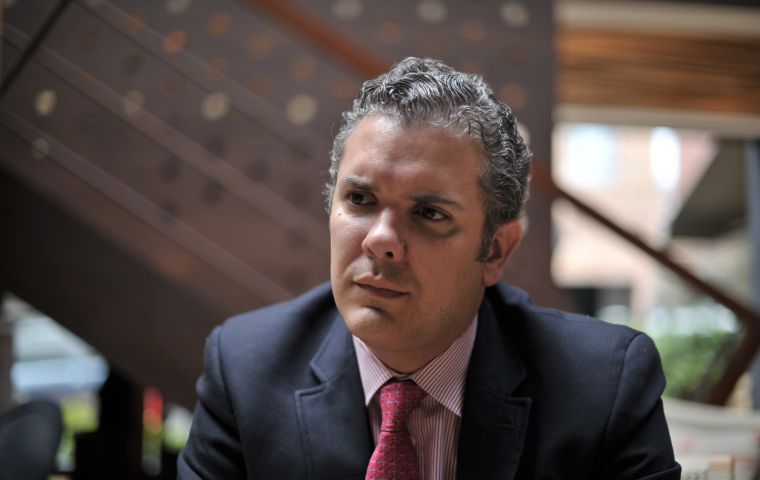MercoPress. South Atlantic News Agency
Uribe protegé Duque, and ex Bogotá mayor dominate Colombia's legislative elections
 Duque, 41, is a lawyer and senator who worked at the IDB and UN. He has enjoyed solid showing in polls, in the most recent presidential survey.
Duque, 41, is a lawyer and senator who worked at the IDB and UN. He has enjoyed solid showing in polls, in the most recent presidential survey.  Petro’s Colombia Humana party highlight his work to improve conditions for the poor. He has pledged a “social economy” that will shift from oil to agriculture.
Petro’s Colombia Humana party highlight his work to improve conditions for the poor. He has pledged a “social economy” that will shift from oil to agriculture. Right-wing candidate Ivan Duque and leftist Gustavo Petro will lead their respective coalitions in Colombia’s May presidential election after winning primaries on Sunday. Duque, a protégé of former President Alvaro Uribe and the standard bearer for the Democratic Center party, beat fellow candidates Marta Lucia Ramirez and Alejandro Ordonez for his coalition’s nomination. He got more than 3.9 million votes and 96% of the votes counted.
Petro, a prominent leftist, former member of the disbanded M-19 guerrilla group and former mayor of Bogota, defeated Carlos Caicedo for their left-wing coalition’s nomination, with 2.7 million votes and 96% of votes counted. That represented about 30% fewer votes than Duque, though the two have been close in presidential vote polls.
Voters were allowed to vote in one primary and also voted in legislative elections, in which no party won a majority. Many Colombians will have voted strategically in the primaries, hoping to influence candidate selection for the presidential vote on May 27.
Duque and Petro are among several other candidates running for the presidency, including former mayor of Medellin Sergio Fajardo and ex-vice president German Vargas Lleras.
Duque, 41, is a lawyer and senator who worked at the Inter-American Development Bank and United Nations. He has enjoyed solid showing in polls, coming within the margin of error behind Petro in the most recent presidential survey.
Supporters of 57-year-old Petro’s Colombia Humana party highlight his work to improve conditions for the poor. He has pledged to create a “social economy” that will shift the economy from oil toward agriculture.
Some voters gathered outside polling places to protest a shortage of ballots for the primaries. But the head of the national registry, which runs voting in the country, rejected suggestions to close polls later. No party won a majority in either legislature.
Duque’s Democratic Center party was leading the number of votes in the Senate, with 88% reporting, with over 2.2 million of 15.6 million votes. The Radical Change party was second and the Liberal party third.
In the lower house, with 86% reporting, the Liberal party was leading, with more than 2.1 million votes of 15.3 million total. The Democratic Center party was a close second, with more than 2 million votes.
The elections mark the debut of the former FARC rebels as a political party. The group, which preserved its famous initials with its new name, the Revolutionary Alternative Common Force, demobilized under a 2016 peace deal.
The FARC is guaranteed five seats in both the 108-member Senate and the 172-member lower house under the terms of the accord. It fielded 74 legislative candidates but got only 0.22% of votes for the lower house and just 0.35% in the Senate.
The group’s presidential candidate withdrew from the race last week due to ill health and the party is not naming a replacement. Peace talks dominated elections in 2014. Now candidates in the 50 million-strong country are focusing on health, education, corruption and the economy.
High voter abstention is typical in the country. Just over 40% of eligible voters turned out for the legislative elections.




Top Comments
Disclaimer & comment rulesCommenting for this story is now closed.
If you have a Facebook account, become a fan and comment on our Facebook Page!